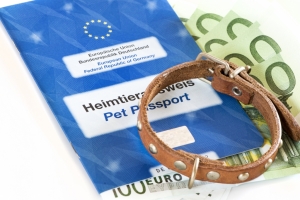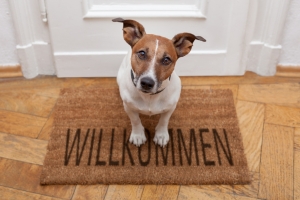


Can you do without your trusty four-legged friend while on vacation? Would you leave them at the kennels or with relatives? For many dog owners, this is out of the question – and it can stay that way. Vacationing on the Adriatic is very dog-friendly and even well-adjusted to its visiting dogs.
General Entrance Regulations for Dogs
According to the Foreign Ministry, dogs and other pets are allowed into Croatia when their owners travel to there for vacation. It is required that the animals must be micro-chipped and vaccinated against rabies. They will control whether or not the animal has been vaccinated, so the official vaccination certificate must be brought along. Furthermore, dogs can only be brought into the country with a pet passport. Alternatively, a veterinary certificate will also be recognized. A further examination by the veterinarian is not required according to the Foreign Office.
Since each member state of the European Union may independently decide upon their own regulations, it is important to pay attention to further regulations when entering Croatia with a dog. According to the Croatian Ministry of Agriculture, you are allowed to bring a maximum of 5 pets with you; even if they are not being imported for commercial purposes - for instance, to be sold. Furthermore, travelers from Germany are allowed to bring not vaccinated dogs with them if they are younger than three months. A prerequisite is that the dogs come directly from the care of the breeder, have not lived with wild animals, have a valid pet passport and are chipped. Travelers must wait at least 21 days after the vaccination before entering Croatia.
Forbidden Dog Breeds
Some breeds are, as a rule, forbidden from entering into Croatia. According to the regulations on dangerous dog breeds from the official journal NN 26/05, Staffordshire Terriers, Rottweilers and all other dogs related to these breeds or mixed breeds, such as Pitbull Terrier, are not allowed to enter. Additionally, all dogs that, regardless of race and for no apparent reason, pose a danger to people, attack people or other dogs, have already been involved in attacks or were bred for dog fighting/trained, are not allowed into the country.
Basic Rules of Conduct During the Stay
If you are traveling with your dog to Croatia, the sea or inland, there are some rules to keep in mind. As well as the stay in Croatia, there are rules for restaurants, public places and various sights. As is customary in Germany, dog owners should always keep their four-legged friends on a leash - especially if they are in public places, or generally among people. This is for the safety of the dog as well as the other people - for example, young children. It is required that you always carry poop disposal bads with you and a muzzle because dogs must wear one while using public transport. Breeds such as Great Dane, Doberman, German Shepherd, St. Bernard and all other breeds classified as dangerous must always wear a muzzle. Apart from these rules, Croatia is a very dog-friendly country with numerous restaurants and beaches (official and unofficial), where four-legged friends are warmly welcome.
Visiting National Parks, Sightseeing & Other Attractions
Specific rules of conduct for dogs also apply to natural and cultural sites in Croatia. In national and nature parks as well as in other protected areas in particular, dogs are potentially not allowed. As a rule, dogs are allowed in the Paklenica, North Velebit and Ucka National Parks. The Krka National Park and the natural paradise of Kamenjak also allow dogs, but only on a leash. Additional points of interest for tourists with dogs are castles or ruins. In cathedrals, historic buildings or the like, you have to find out in advance whether or not it would be more appropriate to leave your dog at the hotel rather than take them into the city center with the pressing crowds.
Checklists: What you have to bring and what you have to be aware of!
Traveling into Croatia with a dog:
- A valid European Union Pet Passport or an official certificate from the veterinarian
- A valid microchip (The number must match the one on the pet passport)
- An up-to-date rabies vaccination, proven by a vaccination certificate
Recommended documents for entry:
- Proof of ownership or breeding papers
- Emergency numbers for the practicing veterinarian
- The number of the personal liability insurance for dogs
Equipment and provisions for the dog:
- Collar, leash, muzzle and a harness with the dog license and name tag
- Food and water for the drive
- Safety harness for the car and a kennel for the airplane
- Food and bowls
- Dog bed and blankets
- Dog toys and treats
- Poop disposal bags and a dog whistle
- Hygiene utensils such as towels, a brush and shampoo
- if necessary, swimming supplies- and sun protection (beach shelter, etc.)
Pharmaceuticals for dogs:
- Medicine for travel sickness, anxiety or diarrhea
- First aid kit for dogs / Bandages and iodine
- Tick spray, tweezers for ticks or similar products
- Disinfection for wounds
- Preventative against ticks and fleas
- If necessary, any special medications
Important numbers and addresses:
- Look up local veterinarians and vet clinics
- Write down telephone numbers and addresses
- Contact data for the dog personal liability insurance in your home country
- Contact data for dog insurance in your home country
Final Recommendations
Basically, it is advisable to inform yourself of and prepare the required documents in advance. When traveling by car or train, you should check the entry requirements of the countries that you will potentially travel through. Ideally, it is best to visit a veterinarian in your home country to completely check the animal a couple of months before you leave on vacation. Veterinarians are usually well-informed of the required information and documents needed for entry into any EU member state. Fortunately, tourists with dogs are greeted with a smile in Croatia. If your four-legged friend behaves well and does not run around uncontrollably, you should have no problems with the locals or authorities.
close
Why Best of Croatia ?
- Best Price Guaranteed
- No booking fees
- Thousands of satisfied customers
- Numerous objects with direct-booking option
- Intelligent search function with numerous useful filter options
- Extensive travel guide with lots of pictures and videos over 500 pages
- Detailed beach guide with more than 700 beaches







 Best of Croatia
Best of Croatia



























